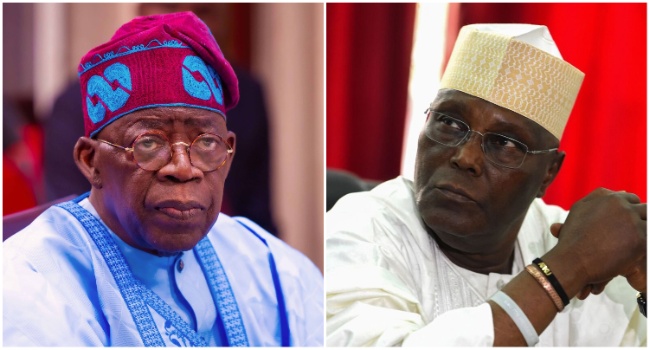Headlines
Atiku To Supreme Court On Tinubu’s Certificate Saga

The People’s Democratic Party (PDP) presidential candidate, Atiku Waziri Abubakar, has appealed to the Supreme Court to allow him to present fresh evidence against President Bola Tinubu in his push for nullification of the February 25 election results.
Atiku had alleged that Bola Ahmed Tinubu forged the documents he presented to the Independent National Electoral Commission (INEC) before the election.
This followed the release of the president’s academic records by the Chicago State University in the United States.
In a press conference held on October 5 in Abuja, the PDP candidate alleged that President Tinubu’s academic records were fraught with discrepancies and forgeries and vowed to present the evidence in the Supreme Court.
The former Vice President applied to file the evidence he obtained at the CSU in Supreme Court on October 7.
In a response filed through his lead counsel, Wole Olanipekun (SAN), the president described the application as an abuse of the court process and urged the apex court to dismiss it.
But in a motion filed on Wednesday, Atiku urged the Supreme Court to look away from the technicality and grant his application.
He argued that submission of forged documents for election by any candidate is a grave constitutional issue and must be discouraged.
“Presenting forged documents by any candidate, especially by a candidate for the highest office in the land, is a very grave constitutional issue that must not be encouraged,” the ex-Vice President stated.
He also listed a number of cases in his bid to convince the court to accept the application.
The motion read: “The Supreme Court, as the Apex Court and indeed the Policy Court, has intervened time and again to do substantial justice in such matters of great constitutional importance, as it did in the case of AMAECHI vs. INEC (2008) 5 NWLR (Pt. 1080) 227 and OBI vs. INEC (2007) 11 NWLR (Pt. 1046) 565. The Supreme Court applied the principle of ubi jus ibi remedium to ensure substantial justice is done in such novel scenarios.
“The need to rebuff, eschew, and reject technicality and the duty of Court to ensure substantial justice is very germane in this matter, given the gravity of the constitutional issue involved in deciding whether a candidate for the highest office in the land, the office of President of the Country, presented a forged certificate or not.
“In urging the Honourable Court to overrule the objections of the Respondents, we can do no better than to commend to your noble Lordships the insightful words of the Supreme Court in ASSAH & ORS V. KARA & ORS (2014) LPELR-24212(SC), per Rhodes-Vivour, JSC as follows:
“Law is blind. It has no eyes. It cannot see. That explains why a statue of a woman with her eyes covered can be found in front of some High Courts. On the contrary, justice is not blind. It has many eyes; it sees and sees very well.
“The aim of Courts is to do substantial justice between the parties and any technicality that rears its ugly head to defeat the cause of justice will be rebuffed by the Court.”





